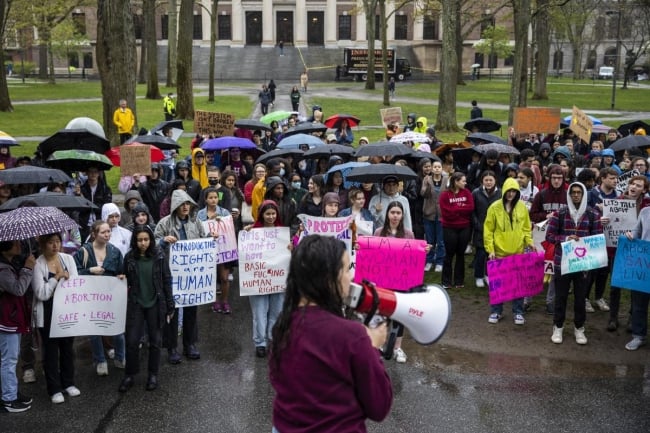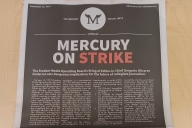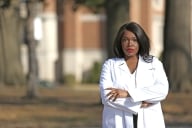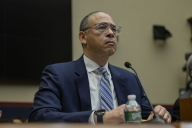You have /5 articles left.
Sign up for a free account or log in.

Even with campuses full of students who don’t see eye to eye on several issues, more of them say they are reluctant to speak their minds than they did in previous years.
Boston Globe/Getty Images
The percentage of college students who believe the political and social climate on their campus prevents people from freely expressing themselves rose from 54.7 percent in 2019 to 63.5 percent in 2021, according to a new survey conducted by Heterodox Academy.
At the same time, the percentage of students who describe themselves as reluctant to speak freely on certain topics deemed controversial was far lower—nearly 41 percent felt that way in 2020, according to the nonpartisan education research organization. The survey also found that 39.5 percent of students felt reluctant to freely discuss political topics in 2021, and 30.5 percent and 31.8 percent of students, respectively, in those years were hesitant to discuss religious topics.
The survey found that students nonetheless overwhelmingly favor free and open expression among themselves and others on campus, with the percentage of those supporting it rising from 85.4 percent in 2020 to 87.4 percent in 2021.
Heterodox Academy noted that the findings coincided with the contentious events surrounding the 2020 presidential election at a time when Americans were deeply politically polarized.
The results of the survey left observers concerned about the effects of the perception of stifled expression on college campuses and about whether that perception is rooted in reality.
The survey report “points to a paradox,” said Jacqueline Pfeffer Merrill, director of the Campus Free Expression Project of the Bipartisan Policy Center. “It says that students value open discourse and free expression, and at the same time it reports a crisis-level killing of discourse. All of us need to be focused on this paradox; it’s at the core of so much we’re thinking about.”
Sean Stevens, senior research fellow for polling and analytics at the Foundation for Individual Rights in Education, a campus civil liberties watchdog group, said the Heterodox survey and similar surveys by FIRE and the Knight Foundation in recent years have reached the same conclusion.
“At the end of the day, a notable portion of the students, no matter what demographic they belong to, feel that it’s hard to discuss certain topics on campus,” he said.
Stevens designed the first of the Heterodox student surveys in 2019 before joining FIRE and analyzed the 2020 results for FIRE last year. In that analysis, he described the climate for student expression as “stifling.” He said the new survey indicates that characterization is still apt.
He said college campuses should be spaces where people can speak freely.
“If you care about higher education, it’s something you should be concerned about with some of these results, because they seem to be pretty consistent no matter who is doing the survey.”
While the data reflect how the 4,310 students surveyed over the three-year span answered the questions, they may not give concrete reasons for students’ expressed reluctance to speak openly about their beliefs, said Elizabeth Niehaus, senior fellow at the National Center for Free Speech and Civic Engagement at the University of California.
Niehaus, an associate professor of educational administration at the University of Nebraska at Lincoln, said while she did not want to cast doubt on the survey or the motives of the Heterodox Academy, she did question whether the answers to the survey painted a true picture of what the students believe.
“I do think the dominant narrative is about politics—it’s about Republican or conservative students being silenced on campus,” Niehaus said. “But I have doubts about whether it reflects reality or if it creates the reality.”
Her greatest concern is that people with ulterior motives will use the results of the survey, and others like it, in bad faith and to further the narrative repeated in conservative circles that American colleges and universities have largely become liberal bastions of left-wing administrators and faculty members imposing their personal political beliefs on students and punishing those who do not agree with them.
“I think we have to think about what the incentives are for producing the type of narrative around student self-censorship and political silencing,” said Niehaus, whose research paper as a 2020–21 fellow at the UC center for free speech was titled “Self-Censorship or Just Being Nice: Understanding College Students’ Decisions About Classroom Speech.”
Her concerns were echoed by John K. Wilson, a former fellow at the free speech center, who argued in an opinion piece for Inside Higher Ed in January that student surveys on self-censorship “provide no definitive evidence of repression.”
Niehaus said so many other factors influence how students answer questions for such surveys that it’s difficult to draw conclusions from the answers. Those factors include the state of the mental health of student as well as the context of the situations in which they are reluctant to discuss certain topics, such as in a class where the controversial topic is unrelated or irrelevant to the coursework.
Her research is focused on longer, more nuanced conversations with students, she added, rather than recording answers to questions.
“We, as academics studying this, live in that world of measuring controversial social and political conversation. The students don’t live in that world,” she said. “So 20 different students might read the questions and interpret them 20 different ways.”
Kyle Vitale, Heterodox Academy’s director of programs, said the authors of the Heterodox survey were diligent about refining the questions asked in 2020 and 2021, during the COVID-19 pandemic, to assure that they accurately captured why students felt the way they did and what factors affected their answers.
“We want to be above the culture war,” Vitale said, adding that he understood the concerns about whether the survey itself was a valid indication of students’ feelings. “At the end of the day, it’s a tool.”
Among the new information emerging in the last two years of the survey was the way students self-identified—5 percent identified as nonbinary in 2021 compared to 0.2 percent in 2020, and 4.3 percent identified as transgender in 2021 compared to 1.4 percent the previous year.
“The more our data can identify the myriad lenses people carry with them, the more we can reflect them and the more they can reflect that to others on campus,” Vitale said.
The survey report emphasized that the effects of the pandemic played an important role in the survey results and how to interpret them, as the isolation of lockdowns and virtual learning also kept students away from people and entities that differed from their backgrounds and upbringings.
“That’s a potent cocktail of loneliness and of media bombardment,” Vitale said, noting students’ increased exposure to social media and other messaging while alone and away from campus. “It overloaded our sense of isolation and our tribal senses.”
Merrill also acknowledged the emotional difficulties students faced during the pandemic and suggested that anyone working on promoting free expression on campuses must include serving students’ mental health needs as part of those strategies. Her larger concern, though, is that students are leaving college unprepared for an important part of adult public life—being able to engage in reasonable, respectful discourse with those with opposing views—and that colleges were failing in their responsibility to prepare them to do so.
“If almost two-thirds of students feel they are restricted from free expression on campus, then we’re really missing out on the accomplishment of the civic mission of higher education,” Merrill said. “We’re not making it safe or comfortable for scholars to engage in research agendas that are productive, or preparing students to be participants in pluralistic democracies.”
“We’re not going to get past this polarized culture if our leaders don’t learn how to talk about this when they’re undergraduates, which is prime time for developing these skills.”








